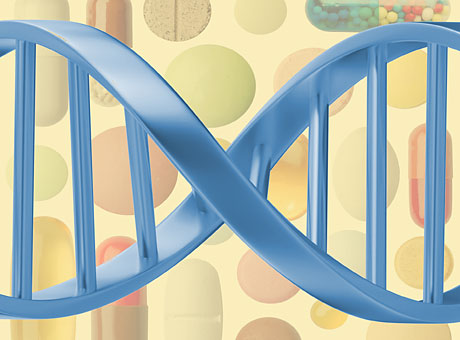
User-friendly database
Matching genes with potential therapies

BY Caroline Arbanas
A massive online database now matches thousands of genes linked to cancer and other diseases with drugs that target those genes. Some of the drugs are approved by the U.S. Food and Drug Administration, while others are in clinical trials or just entering the drug development pipeline.
The database was developed by identical twin brothers, Obi Griffith, PhD, research assistant professor of medicine, and Malachi Griffith, PhD, research instructor in genetics, whose interest in pairing drugs with genes is as much personal as it is scientific. Their mother died of breast cancer 17 years ago, weeks before their high school graduation.
“We wanted to create a comprehensive database that is user-friendly, something along the lines of a Google search engine for disease genes,” explained Malachi Griffith. “As we move toward personalized medicine, there’s a lot of interest in knowing whether drugs can target mutated genes in particular patients or in certain diseases, like breast or lung cancer. But there hasn’t been an easy way to find that information.”
Details of the Drug Gene Interaction Database were reported online Oct. 13 in Nature Methods. The database also includes genes involved in Alzheimer’s disease, heart disease, diabetes and many other illnesses. The Griffiths created the database with a team of scientists at The Genome Institute at Washington University.
The database is easy to search and geared toward researchers and physician-scientists who want to know whether errors in disease genes — identified through genome sequencing or other methods — potentially could be targeted with existing drug therapies. Additional genes included in the database could be the focus of future drug development efforts because they belong to classes of genes that are thought to make promising drug targets.
“Developing the database was a labor of love for the Griffiths,” said senior author Richard K. Wilson, PhD, director of The Genome Institute. “There’s an amazing depth to this resource, which will be invaluable to researchers working to design better treatment options for patients.”
Wilson and his colleagues caution that the database is intended for research purposes and that it does not recommend treatments. The primary purpose of the database is to further clinical research aimed at treating diseases more effectively.
The free, publicly available database brings together information from 15 publicly available databases in the U.S., Canada, Europe and Asia. To access it, visit dgidb.genome.wustl.edu.






